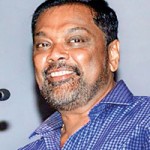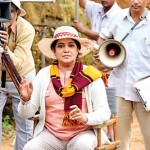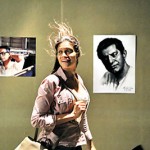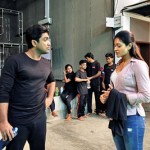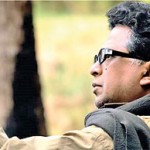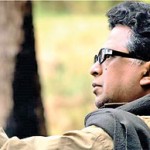Jayantha travels across the time in search of love
View(s):- ‘Midunu Vishwaya’—‘Frozen Cosmos’
By Susitha Fernando
Award winning theatre, teledrama and film director Jayantha Chandrasiri is ready with his newest film ‘Midunu Vishwaya’ (Frozen Cosmos) a story of love between two persons who are living in two different time zones.
A tale of time-travel from 1960 to 2020, a yesteryear film star who has reached the stardom as a popular actress but awaiting to win the Best Actress make contact with a present day theatre trainer. They fall in love but knowing that they would never meet. ‘This is a love that never meets. There is a time separation. But for love even this is not an obstacle,’ said Jayantha Chandrasiri veteran filmmaker who is known for his innovative scripts and stories. According toww the plot the story sets in the 1960s golden era of cinema and an actress who was in the top of her popularity. This was a time where film lovers were worshiping the stars and placing them on pedestals, the director said.
“But the personal and family life of female star featured is a tragedy and this is mainly due to lack of love,” he explained. Jayantha used time travelling, a method he used in his teledrama “Akala Sandhya” employs in his newest film. “Within the present there is past and future. The best example for this is my present is part of my past and future as well. It is because of the past that I am here. This includes even the time I was in my mother’s womb. As an artiste I am trying to capture the past. When we are trying to do that we come across certain problem and issues that need to be solved” Jayantha said.
- Producer Ruwan Jayasinghe
- Director Jayantha Chandrasiri
To travel along the time instead of western concept like ‘The Time Machine by H. G. Wells’ Jayantha uses various mediation that are inherent to the local cultures and religions. The director explained that the time that was set for the film, 1960s is an era where there was a special culture within the stardom.
“We see this in our neighbour India and the western cinema mostly. People used to follow stars and tried to be like them. And this was a time in which the number one entertainment mode was cinema. There was no other entertainment. It was only radio that was there,” Jayantha explained.
However according to Jayantha when the mass communication was developed this special place enjoyed by cinema was lost. “But to a certain extent it is there in India. However even the Indian cinema is circulating around handful of cinema artistes even though there are thousands of artistes. It is the few who run the show,” he said.
Referring to one of the main themes in his film, Jayantha said that most of the actors know that it is a subject you have to study. “In the past there was a practice of imitating acting without going to inner feelings. In case even if they went to the inner feelings it was just an imitation,” Jayantha said referring to 1960 cinema and stars.
He said until actresses like Iranganie Serasinghe who joined cinema after academically studying it and others like Punya Heendeniya, Malani Fonseksa, Gaminin Fonseka and Joe Abeywickera who learnt with their innate talents. “Many actors and actresses in the past cinema didn’t realise the importance of real acting,” he said.
Starting from “Saraswathi” in 1979 Jayantha first became popular as a playwright producing popular theatre productions like ‘Ath’, ‘Mora’ and ‘Oththukaraya’. Entering the mini screen Jayantha became a popular teledrama director with ‘Weda Hamine’, ‘Dandubasnamanaya’, ‘Akala Sandaya’, ‘Sathara denek Senpathiyo’ and ‘Rejina’ most of which clinched awards.
Searching for that next furry family member but couldn’t find one in your area? Hitad.lk has the solution with our extensive listings of dogs for sale in Sri Lanka!



